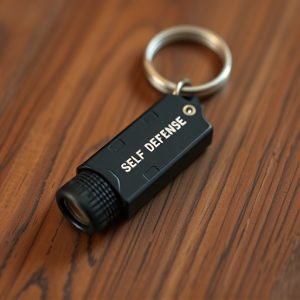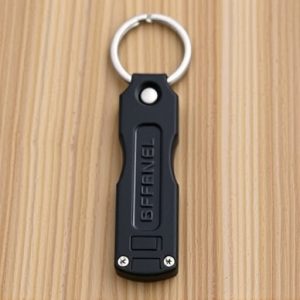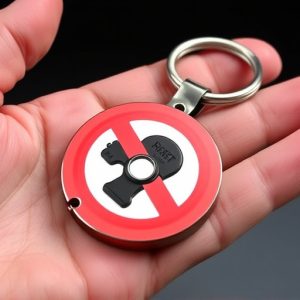Cat Ear Self-Defense Keychains: Legal Requirements State by State
Citizens in many regions enjoy the right to protect themselves and their property, including carryin…….
Citizens in many regions enjoy the right to protect themselves and their property, including carrying self-defense tools like Cat Ear Self Defense Keychains. However, their legality varies greatly by state due to differing laws regarding self-defense weapons. Individuals must research local regulations on size, weight, active ingredients, permits, and specific restrictions to ensure compliance and avoid legal issues. Even seemingly harmless items can have limitations, such as age requirements, common exclusions, and restrictions in public spaces. Understanding these guidelines is crucial for personal safety when relying on a Cat Ear Self Defense Keychain.
“Uncovering the legal landscape surrounding self-defense keychains, particularly the unique Cat Ear design, is essential for those seeking personal safety. This comprehensive guide explores state-by-state regulations, focusing on the legality of cat ear self-defense keychains and the rights they afford. From understanding your self-defense protections to navigating restrictions and ensuring compliance, this article equips readers with knowledge to make informed decisions regarding their safety. Stay ahead of legal requirements and empower yourself with the facts.”
- Understanding Self-Defense Rights and Regulations
- Legal Considerations for Cat Ear Self-Defense Keychains
- State-by-State Breakdown of Laws and Permits
- Common Exclusions and Restrictions to Be Aware Of
- Ensuring Safety and Compliance While Carrying a Self-Defense Device
Understanding Self-Defense Rights and Regulations
In many jurisdictions, citizens have the right to protect themselves and their property, a fundamental aspect of personal safety. This right is often extended to carrying self-defense tools, such as Cat Ear Self Defense Keychains, which are compact and easily accessible. However, understanding the legal requirements is crucial before utilizing any self-defense device. The legality of these tools varies from state to state, with some allowing their use for personal protection while others have strict regulations or even ban them entirely.
When carrying a Cat Ear Self Defense Keychain, it’s essential to familiarize yourself with local laws and guidelines. This includes knowing when and where it is legal to deploy such a device, the potential consequences of using it, and any restrictions on its design or functionality. Some states might require individuals to have a permit for self-defense tools, while others may have specific rules regarding their size, weight, or active ingredients (in the case of pepper spray keychains). Staying informed about these regulations is vital to ensure compliance and avoid legal repercussions.
Legal Considerations for Cat Ear Self-Defense Keychains
In recent years, cat ear self-defense keychains have gained popularity as a trendy and unique personal safety tool. However, it’s crucial to understand the legal considerations surrounding their use, especially since regulations can vary significantly from state to state. These tiny gadgets, often adorned with cute cat ears, contain a sharp metal mechanism designed to deter potential attackers, offering users a sense of security in various situations.
When it comes to legality, cat ear self-defense keychains are subject to local and regional laws regarding self-defense weapons. Some states have explicitly included these keychains in their definition of legal self-defense tools, while others may not have specific mention but still allow them under broader self-defense provisions. It’s essential for individuals considering carrying such a device to research and understand the specific laws in their state or region to ensure compliance and avoid any potential legal issues.
State-by-State Breakdown of Laws and Permits
In the United States, the legal landscape surrounding self-defense keychains, like the popular Cat Ear Self Defense Keychain, varies significantly from state to state. What may be legally permissible in one state could be strictly regulated or outright banned in another. This is largely due to differences in local laws and regulations regarding concealed weapons, self-defense tools, and personal safety devices.
Understanding these variations is crucial for individuals considering carrying a self-defense keychain. Some states have specific provisions for small, non-lethal self-defense devices, while others may classify such items as weapons, necessitating permits or registration. For instance, certain states allow for the carry of pepper spray or personal stun guns without a permit, while others demand thorough background checks and potential training certifications. It’s essential to research and comply with local laws to avoid legal repercussions when using self-defense tools like Cat Ear Self Defense Keychains.
Common Exclusions and Restrictions to Be Aware Of
When carrying a Cat Ear Self Defense Keychain, it’s important to be aware of common exclusions and restrictions that may apply in your state. Many states have specific laws regarding self-defense devices, and even seemingly harmless items like keychains can be subject to certain limitations. For instance, some states prohibit the use of these devices on children or in certain public spaces like schools or government buildings. Additionally, there might be restrictions on the level of force that can be used, with many jurisdictions requiring proportionality between the threat and the response.
Another exclusion to note is the age requirement for possession. Some states allow only adults over a specific age (often 18 or 21) to carry self-defense keychains, while others may have even stricter regulations. Furthermore, certain Cat Ear Self Defense Keychain models might be classified as weapons, leading to increased restrictions or outright bans in some areas. Always check your state’s local laws and regulations before assuming that a specific self-defense keychain is legal for carry.
Ensuring Safety and Compliance While Carrying a Self-Defense Device
When carrying a self-defense device, like a Cat Ear Self Defense Keychain, it’s paramount to prioritize safety and adhere to legal guidelines. Each state has its own regulations regarding what constitutes legal self-defense and the permits or registrations required for certain devices. For example, some states allow concealed weapons with a permit, while others have strict restrictions on the type and size of self-defense tools permitted in public spaces.
Before relying on your Cat Ear Self Defense Keychain as a safety measure, research and understand your state’s laws. Check for any specific requirements or limitations regarding self-defense keychains, ensuring you remain within legal boundaries to avoid potential consequences. Staying informed and compliant is crucial not only for personal safety but also for the well-being of those around you.
When it comes to utilizing a cat ear self-defense keychain, understanding your state’s specific laws is paramount. This comprehensive guide has navigated through the legal intricacies of these defensive devices, highlighting the varying regulations across different states. By being aware of the do’s and don’ts, including common exclusions and safety measures, you can ensure compliance while empowering yourself with a sense of security. Remember, staying informed about your rights and responsibilities is key to effective self-defense and peace of mind.


